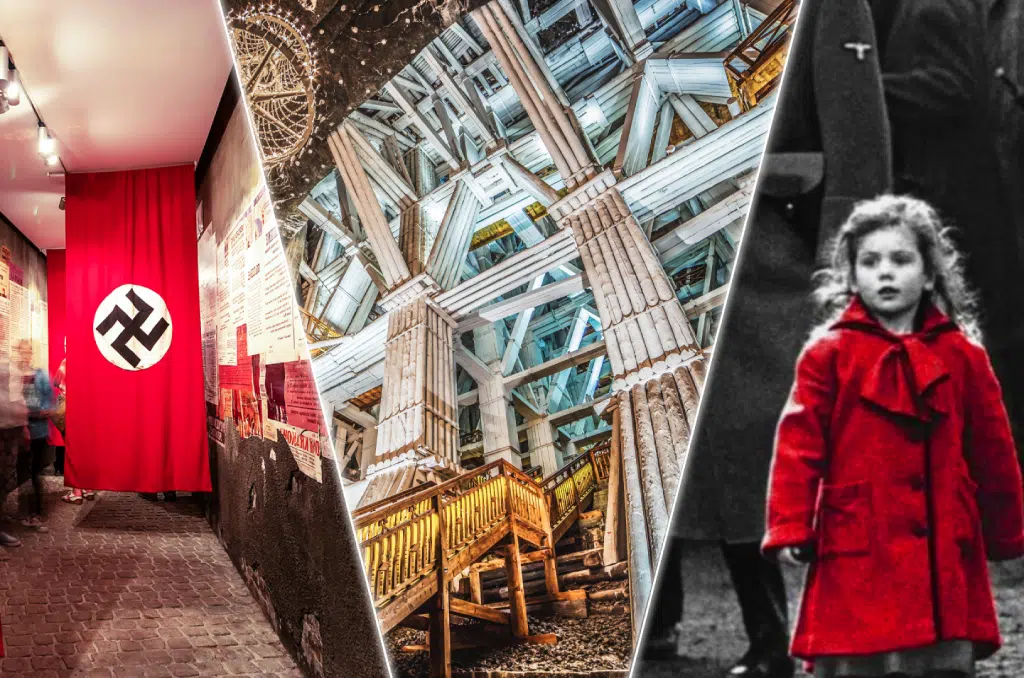Poland during World War II was a harrowing place. It was one of the most important stages of the war as it was here where Soviet and Nazi German forces clashed. Here was also where the brunt of the Holocaust death camps were located. All of this turmoil birthed millions of stories that inspired filmmakers to preserve them in the form of film. Below you’ll find some of our favourite Auschwitz movies from almost all eras of film.
Our picks for best films about Auschwitz:
Schindler’s List (1993)
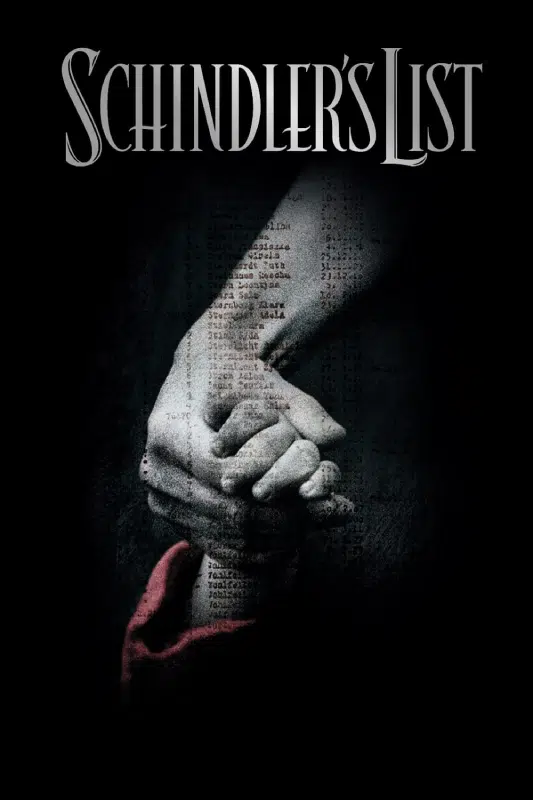
Directed by: Steven Spielberg
Starring: Liam Neeson, Ben Kingsley, Ralph Fiennes
A tale based on real events about how Oskar Schindler (Liam Neeson), a Czech industrialist and Nazi Party member, saved hundreds of Jewish refugees of the Krakow Ghetto by turning his enamelware factory into a legislative haven that protected its Jewish workers from being sent to the death camp. It’s by far the most decorated movie about Auschwitz, with seven Oscars, including Best Picture, Best Adapted Screenplay, Best Director for Steven Spielberg and Best Original Score for John Williams.
Life is Beautiful (1997)
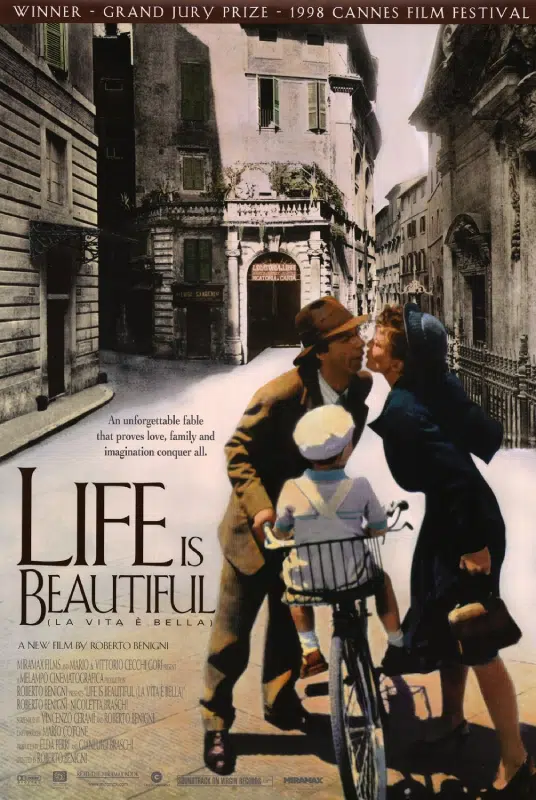
Directed by: Roberto Benigni
Starring: Roberto Benigni, Nicoletta Braschi, Giorgio Cantarini
The topic of Auschwitz is rarely depicted through comedy in such a tasteful manner, but Life is Beautiful certainly makes the mark. The movie follows the story of Guido Orefice (Roberto Benigni), a humorous Jewish-Italian man who ends up being deported to Auschwitz. The wife, Dora (Nicoletta Braschi) gets separated from his family, as Guido, his uncle Eliseo (Giustino Durano) and his son Giosue (Giorgio Cantarini) try to navigate this tragic experience. Guido does it in his own, creative way, as he continues to send messages to his wife in the most ridiculous ways, and helps to keep his son in high spirits by reframing Auschwitz into a game. This movie is an incredible display of the human spirit and making the best of a terrible situation. Benigni’s performance was the first ever non-English male role to be awarded an Oscar for Best Actor.
Conspiracy (2001)
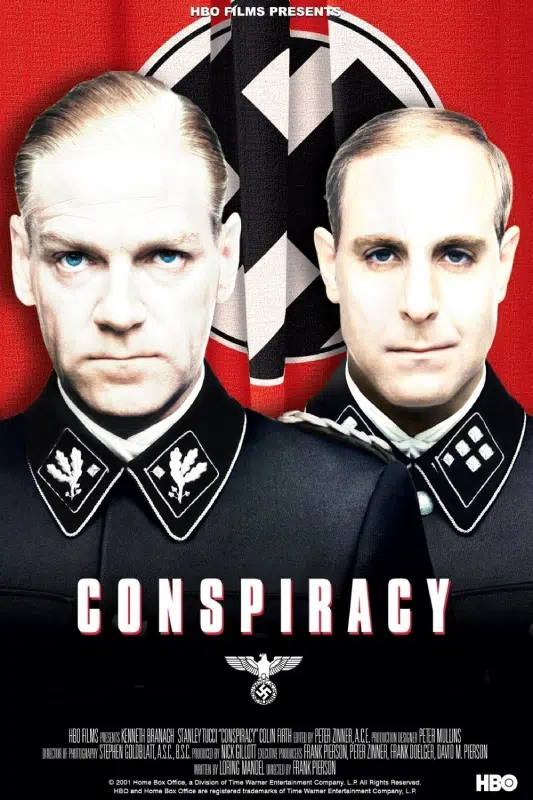
Directed by: Frank Pierson
Starring: Kenneth Branagh, Stanley Tucci
This movie is a dramatisation of the infamous Wannsee Conference on January 20, 1942. On that day, many of the most senior Nazi officials met to discuss the final solution to the Jewish Question. However, as the meeting led by Reinhard Heydrich (Kenneth Branagh) progresses, it becomes more and more obvious that the decision was already made long before the meeting. After an hour of coercion, intimidation and politicking, every commandant present expresses support for the mass extermination of Jews and the creation of a network of concentration camps. This single meeting is what set the Holocaust in motion, killing over 6 million people until the end of the war.
Fateless (2007)
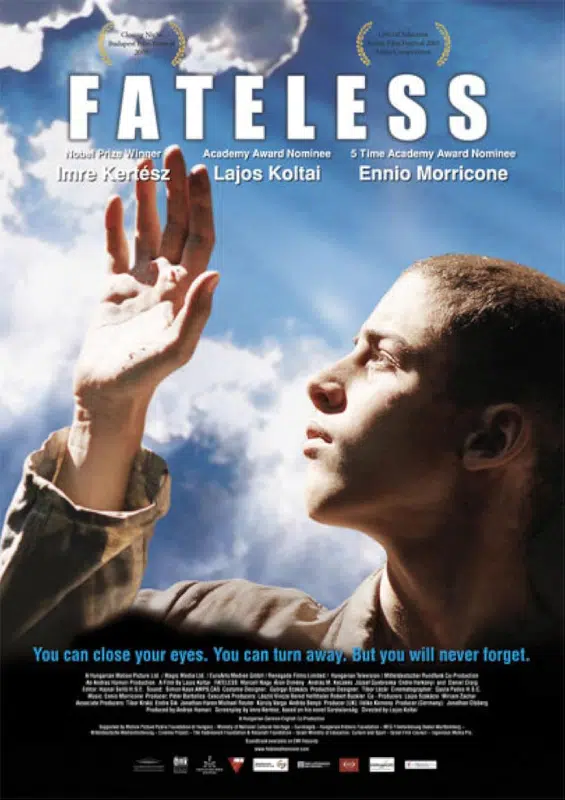
Directed by: Lajos Koltai
Starring: Marcell Nagy
A 14-year-old Jewish kid from Hungary named Gyorgy (Marcell Nagy) is forced to quit school after his father’s deportation to Auschwitz to take care of his family. Soon after, he gets arrested and sent there himself. He only survived because he lied about his age when the children were sent to the gas chambers. In Auschwitz, he meets Bandi (Áron Dimény), a long-time prisoner who teaches Gyorgy everything he knows about surviving a concentration camp. He then uses this knowledge to carry on as he gets transferred from one camp to another. In our opinion, it’s the best foreign language film about Auschwitz.
Defiance (2008)
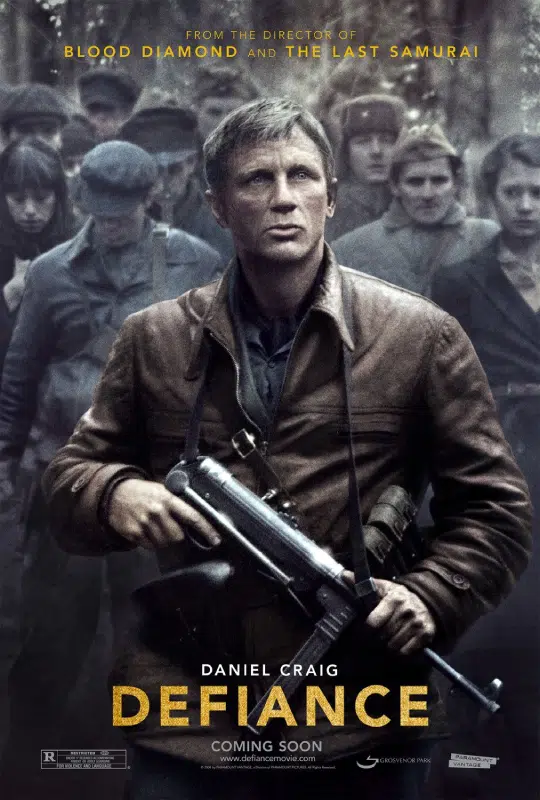
Directed by: Edward Zwick
Starring: Daniel Craig
Based on the novel of the same name, Defiance follows the story of the Polish-Jewish Bielski brothers, who escape to the forests after their parents are killed by the Nazis. They must take the lead over the group of fellow Jews they encounter, establish a partisan group and found a village. Eventually, Tuvia Bielski (Daniel Craig) succeeds in killing the SS officer responsible for the death of his parents. The brothers eventually get involved in a partnership with a Soviet group of partisans, but they choose to stand their ground when it’s revealed that the Germans are going to attack the village with full force on Easter day. When all seems lost, Zus Bielski (Liev Schreiber) and his force join the defence, leading to their victory. It is explained that 3 of the brothers (except Asael; Jamie Bell) survived the war and emigrated to New York City. Thousands of people survived thanks to their cunning and bravery.
Sophie’s Choice (1982)
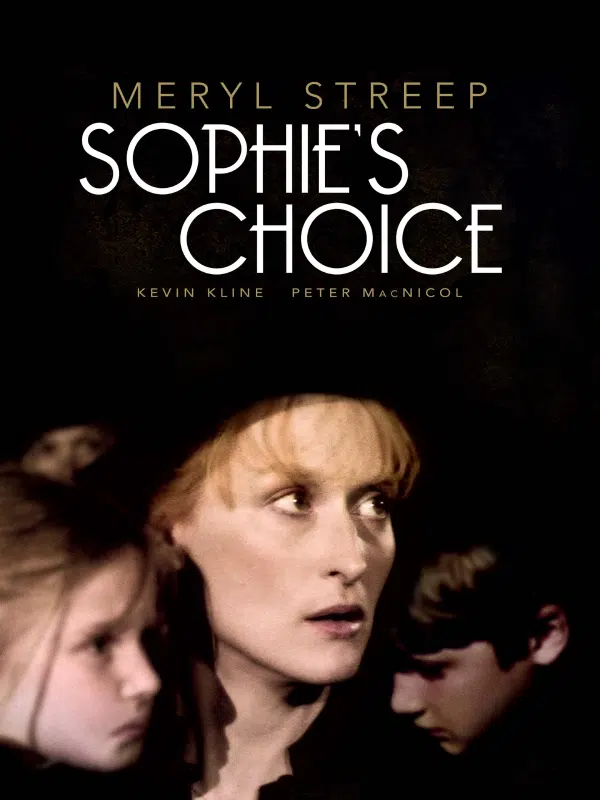
Directed by: Alan J. Pakula
Starring: Meryl Streep, Peter MacNicol
Sophie’s Choice is a classic psychological drama about Sophie Zawistowska (Meryl Streep), a Polish immigrant and Holocaust survivor. As Stingo (Peter MacNicol) moves to New York City to finish writing his novel, he’s introduced to the troubled relationship between Sophie and her abusive lover, Nathan (Kevin Kline). He learns the tragic stories of a woman, who had to choose which of their two children is saved from death at the gas chamber, and a mentally insane man who believes to be a renowned biologist working for Pfizer. A bizarre love triangle is juxtaposed against Sophie’s flashbacks to her life back in Poland. This movie solidified Meryl Streep as one of the greats in Holywood as her performance got awarded a Best Actress Oscar award
Europa Europa (1990)
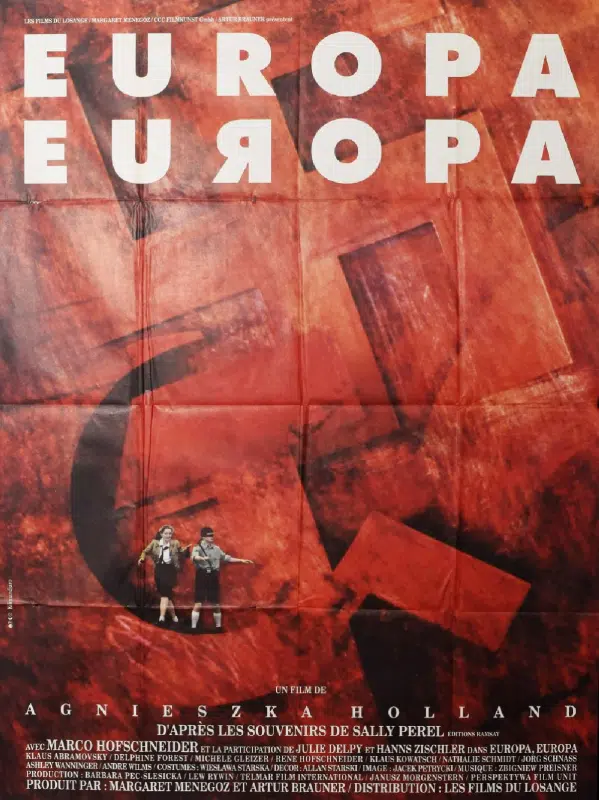
Directed by: Agnieszka Holland
Starring: Marco Hofschneider
Europa Europa is based on the autobiography of Solomon Perel – “I Was Hitler Youth Salamon”. It’s a first-person recollection of a Jewish boy living in pre-war Nazi Germany. The movie starts at the Night of Broken Glass (Kristallnacht). Solek manages to escape the pogrom and his family moves to Poland soon after. However, as WWII breaks out, they get fully caught in the turmoil. Solek gets moved to a Soviet orphanage and learns Russian, before being detained by the Germans. In order not to be sent to the camp, Solomon conceals his identity and claims to be a Volksdeutcher by the name of Josef Peters. He impresses some German officials by identifying the son of Josef Stalin. As years pass, he is successful in hiding his Jewish heritage as we are led through an adventure that’s equally engaging and tragic.
Woman in Gold (2015)
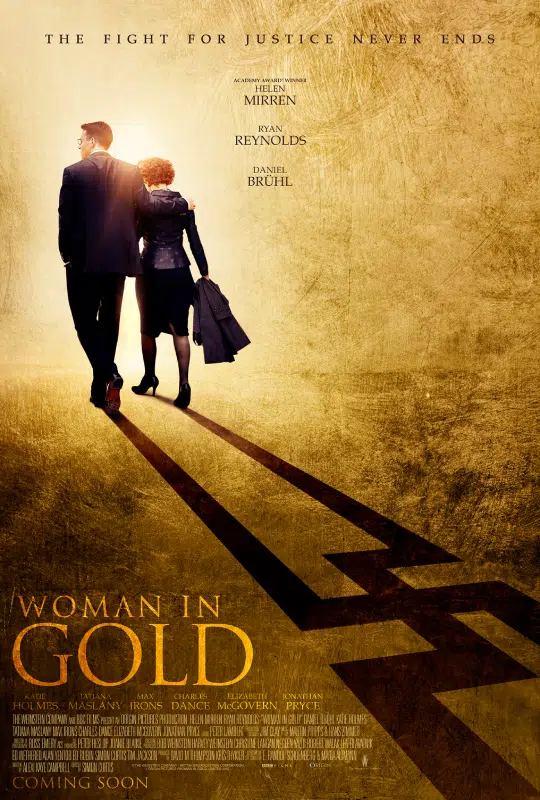
Directed by: Simon Curtis
Starring: Helen Mirren, Ryan Reynolds
Maria Altmann (Helen Mirren) was a witness of the Austrian Anschluss and the prosecution of the Jewish people that soon followed. Her family attempted to flee to the US, but only she and her husband managed to do so. 60 years later, elderly Maria attends her sister’s funeral and finds some notes about her attempt to recover the artworks that were formerly in possession of their family. Most notable of them is a portrayal of their aunt Adele Bloch-Bauer, now known as “Woman in Gold”. Maria decides to pick up where her sister has left off and employs the help of a talented lawyer E. Randol Schoenberg (Ryan Reynolds) to fight with the Austrian government to return the artworks to their rightful owner.
Conclusion
That was our shortlist of interesting movies to watch before visiting Auschwitz. The purpose of this list was to pique your interest and show you a variety of perspectives with a balance of watchability and historical accuracy. If you want to go more in-depth, you can check out our list of Auschwitz books, which in our opinion, have much more historical merit. The 1985 documentary Shoah also deserves an honourable mention for its extensive depiction of all the victims of the Holocaust.
Either way, there’s no way to fully understand and experience the tragic history of German concentration camps other than visiting one. Check out our extensive offer of Auschwitz tours from Krakow.
FAQs
What are the best films about Auschwitz and the Holocaust?
Some of the best films about Auschwitz and the Holocaust include Schindler’s List, Life is Beautiful, Conspiracy, Fateless, Defiance, Sophie’s Choice, Europa Europa, and Woman in Gold. These movies offer a range of perspectives on the Holocaust, from survivor stories to wartime dramas.
Why is Schindler’s List considered a must-watch Holocaust film?
Schindler’s List is widely regarded as one of the most impactful Holocaust films because of its powerful storytelling and historical accuracy. Directed by Steven Spielberg, it portrays Oskar Schindler’s efforts to save over 1,000 Jewish refugees from Auschwitz. The film won seven Oscars, including Best Picture and Best Director.
How does Life is Beautiful approach the Holocaust in a unique way?
Life is Beautiful uses humour and optimism to tell the tragic story of a Jewish-Italian man sent to Auschwitz. Unlike most Holocaust films, it blends comedy with tragedy as the protagonist, Guido, uses his imagination to protect his son from the horrors of the concentration camp, making it an uplifting yet heartbreaking experience.
What is the historical significance of the Wannsee Conference as shown by Conspiracy (2001)?
Conspiracy dramatizes the 1942 Wannsee Conference, where Nazi officials formalized plans for the Holocaust. The film highlights the decision-making process that led to the mass extermination of Jews and the creation of concentration camps like Auschwitz. It offers a chilling glimpse into the minds of the architects of the Final Solution.
What is the story behind Fateless, the Hungarian film about Auschwitz?
Fateless follows the story of Gyorgy, a 14-year-old Hungarian Jewish boy who survives Auschwitz by lying about his age. The film captures his struggle to endure life in the concentration camps, drawing on lessons from fellow prisoners to survive. It is considered one of the best foreign films about the Holocaust.
How does Sophie’s Choice explore the psychological trauma of the Holocaust?
Sophie’s Choice tells the story of a Holocaust survivor, Sophie Zawistowska, who is haunted by the painful memory of having to choose which of her two children would survive the gas chambers. The film delves into the deep emotional scars left by the Holocaust, with Meryl Streep’s Oscar-winning performance portraying the long-lasting effects of trauma.










